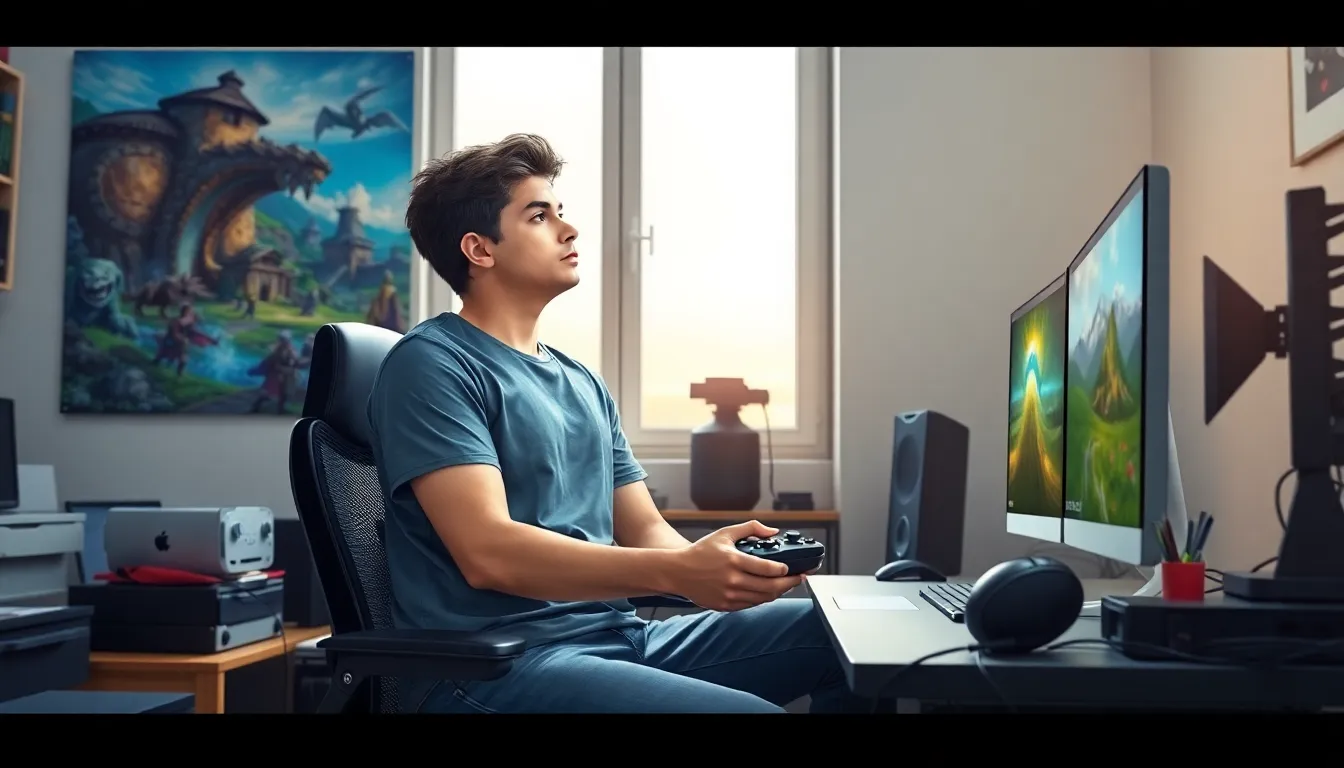
In a world where gaming has taken center stage, it’s easy to find oneself lost in the pixelated realms of Game Overdertoza. One minute you’re conquering virtual kingdoms, and the next, you’re negotiating with your cat for just five more minutes of play. But when the fun turns into a full-blown addiction, it’s time to hit the pause button and reclaim your life.
How to Get Over from Game Overdertoza Addiction
Game Overdertoza addiction involves excessive play that disrupts daily life. Recognizing this addiction can aid in addressing the problem.
What Is Game Overdertoza Addiction?
Game Overdertoza addiction refers to an uncontrollable urge to play the game. Players may neglect responsibilities, relationships, or personal health in favor of gameplay. It often leads to compulsive behaviors where players feel compelled to continue, even when they want to stop. This addiction can stem from various factors, including an immersive environment and the thrill of rewards within the game. Engaging in Game Overdertoza for long hours can create an emotional escape, making it difficult to break free from the cycle.
Signs and Symptoms of Addiction
Identifying signs and symptoms of Game Overdertoza addiction is crucial. Frequent withdrawal from social interactions highlights potential issues. Players often exhibit irritability when unable to play, indicating reliance on gaming for emotional regulation. Loss of interest in other activities typically accompanies excessive gameplay. Spending large amounts of time gaming at the expense of sleep or personal care also signals addiction. Financial consequences may arise as players overspend on in-game purchases, further underscoring the need for awareness and intervention.
The Impact of Game Overdertoza on Life

Game Overdertoza addiction significantly alters various life aspects. Understanding its effects can help individuals address and overcome this challenge.
Emotional Effects
Feelings of anxiety and depression commonly arise from excessive gaming. Irritability occurs when players cannot engage with the game, disrupting their emotional balance. Loss of motivation in everyday tasks mirrors the withdrawal symptoms of this addiction. Interests outside gaming often diminish, leaving individuals without engaging activities. Emotional highs experienced during gameplay lead to lows when faced with reality, creating a cycle of emotional distress. Recognizing these feelings can aid in taking proactive steps toward recovery.
Social Consequences
Social relationships frequently suffer due to Game Overdertoza addiction. Isolation becomes a norm as individuals prefer gaming over real-world interactions. Dependence on virtual connections can replace friendships, leading to loneliness. Conflicts often arise as loved ones grow frustrated with neglect. Participation in social events dwindles, resulting in missed opportunities for connection. Understanding these social consequences is essential in seeking help and rebuilding relationships on a healthy foundation.
Steps to Overcome Game Overdertoza Addiction
Recognizing the signs of Game Overdertoza addiction is crucial to initiating recovery. Acknowledging the problem represents the first step. Without this, consistent gaming habits may continue unnoticed. Individuals often manifest signs such as irritability, isolation, and neglecting responsibilities. Reflecting on personal experiences allows players to confront these behaviors honestly. Admitting the situation can empower individuals to change their gaming patterns. Determining the root causes, such as emotional triggers or stress, helps in understanding and addressing the addiction.
Setting realistic goals plays a pivotal role in overcoming addiction. Establishing achievable targets aids in fostering control over gaming habits. Individuals can begin by limiting playtime gradually rather than stopping abruptly. For instance, they might limit sessions to one hour per day and adjust from there. Tracking screen time helps reinforce awareness of gaming habits. Emphasizing enjoyable non-gaming activities can effectively reduce the desire to play. Creating a balanced schedule ultimately promotes healthier daily routines.
Seeking support is vital in the recovery journey. Engaging with friends and family for encouragement provides an essential safety net. Many individuals find that sharing their challenges enhances accountability and motivation. Joining support groups or forums focused on gaming addiction offers additional resources. Connecting with others who face similar challenges fosters a sense of community. Professional help, such as counseling or therapy, further assists in addressing underlying emotional issues. By accessing varied support systems, individuals can navigate their paths toward recovery effectively.
Coping Strategies for Recovery
Recovery from Game Overdertoza addiction involves adopting effective coping strategies that replace excessive gaming with healthier pursuits.
Finding Healthy Alternatives
Engaging in physical activities offers a robust alternative to gaming. Exercise boosts mood and reduces anxiety, making it an ideal choice for individuals seeking balance. Exploring hobbies like painting, writing, or cooking can also provide fulfilling distractions from the screen. Joining clubs or groups centered around specific interests fosters social connections, helping to combat isolation. Volunteering promotes community involvement and enhances personal fulfillment, steering focus away from gaming.
Developing a Balanced Routine
Establishing a structured daily routine helps maintain a healthy lifestyle. Allocating specific time slots for work, self-care, and leisure creates a sense of order. Setting limits on gaming hours prevents it from dominating time. Prioritizing sleep and meal times ensures essential wellness needs are met. Scheduling quality time with friends and family strengthens relationships, reinforcing support networks. Regularly reviewing and adjusting the routine allows flexibility, ensuring it remains effective and achievable.
Keeping Motivation Alive
Maintaining motivation during the recovery from Game Overdertoza addiction involves consistent effort and self-awareness. Tracking progress becomes essential in this journey to monitor improvements and setbacks.
Tracking Progress
Establishing a system for tracking gaming habits proves effective. Individuals can use journals or apps to log time spent playing, noting triggers and emotions experienced. Evaluating this data helps identify patterns, promoting accountability. Regular reviews of progress reinforce commitment to recovery. Setting specific milestones generates a clear sense of direction, making it easier to stay focused. Adapting strategies based on tracked data enhances the likelihood of achieving goals. Individuals find motivation when they see tangible improvements, thus fostering further commitment to their journey.
Celebrating Small Wins
Acknowledging small victories helps sustain motivation throughout recovery. Celebrations can take many forms, such as treating oneself to a favorite snack or engaging in a fun activity with friends. Recognizing milestones, like reducing gaming time or completing a new hobby, boosts confidence and encourages continued progress. Sharing achievements with friends or family creates a support network that fosters positivity. Building a habit of celebrating small wins reinforces healthy routines, making recovery feel more rewarding. Embracing these moments cultivates a mindset focused on growth and resilience, empowering individuals to stay committed to their goals.
Conclusion
Overcoming Game Overdertoza addiction requires commitment and self-awareness. By recognizing the signs and taking proactive steps, individuals can regain control of their lives. Setting realistic goals and engaging in healthier activities provides a solid foundation for recovery.
Building a supportive network of friends and family enhances accountability and motivation. It’s essential to celebrate progress, no matter how small, as this fosters a positive mindset. Embracing a balanced routine that prioritizes self-care and social interactions can significantly improve overall well-being. With determination and the right strategies, anyone can break free from the cycle of addiction and lead a fulfilling life beyond gaming.






